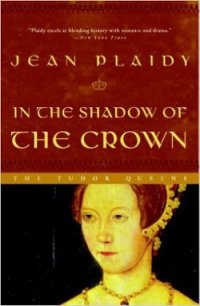Royal Road to Fotheringhay - Plaidy Jean (читать книги полностью без сокращений .txt) 📗
As soon as Moray was alone with the three women he said: “I must have the truth.”
“Livy found him under the bed,” declared Mary. “He came out and sprang at me.”
“I fear Your Majesty has given him some encouragement to behave thus.”
“By my appreciation of his poems?” said Mary angrily.
“There has been talk of dances,” growled her brother.
“In France we always danced the latest dances, and none thought the worse of us for that.”
“But Your Majesty is now in Scotland.”
“Jamie… what do you propose to do to Chastelard? You spoke of his losing his life. I could not consent to that… merely because of a momentary madness, a prank, you might say.”
“He was wearing his sword and dagger. That seems to me significant.”
“What do you mean, Jamie?”
“You must surely know that as Queen of Scotland you have many enemies.”
“Chastelard is no enemy!”
“It would be better for your honor if it could be proved that he is. Get your mistress to bed,” he ordered the Marys. “Madam,” he went on, turning to Mary, “we must speak of this matter in the morning.”
When he had gone, Mary said: “I am sorry we called James in.”
“Madam,” said Flem, “we had to call for help.”
“Yet…” She looked round the room at the shadows cast by the flickering candlelight. “Well… nothing can be done till morning. One of you stay with me. You, Flem… sleep in my bed this night.”
“Yes, dearest Majesty.”
“I do not know why I am afraid, my darlings, but I am. See! I am shivering.”
“He upset you, dear Madam,” said Livy. “Come, let us get you warm, and Flem shall stay the night.”
So Flem and Mary lay in the big bed while Livy drew the curtains and tiptoed away.
Flem noticed that the Queen continued to shiver, and it was dawn before they fell asleep.
MARY FACED her brother and wished that David were with her at Burntisland. She needed counsel now, because David had opened her eyes and she was beginning to distrust James.
“Does Your Majesty realize,” said James sternly, “that this day they will be talking in Edinburgh of how your lover was discovered hiding beneath your bed?”
“My lover! A young poet of the Court!”
“All know Your Majesty’s fondness for poets.”
“But surely we can simply say that he was not my lover. He is a poet and a good dancer.”
“With whom Your Majesty danced in black silk breeches!”
“I’ll not be spied on!” said Mary angrily.
“Shall you not, sister? Alas! It is not for you to say whether you will be or not. You are spied on, and the whole of Knox’s congregation knows that, in black silk breeches, you danced with this man.”
“It was for the purpose of the masque.”
“The Lords of the Congregation have their own ideas as to the purpose.”
“Am I responsible for their evil minds?”
“No, but you must consider them.”
“Chastelard was discovered; he was sent out; there the matter ends. It is no concern of anyone but myself.”
“There again I must most humbly contradict you. It is the concern of Scotland, England, France, Spain, Rome…. You are a Queen and your actions are watched. Your chances of making an advantageous marriage will not be enhanced by a scandal such as this might well become.”
“Oh, one day I may take it into my head to marry where I please, and it may not be one of these hesitant gentlemen who, with their governments, are calculating whether I shall bring them a big enough dowry.”
“If Your Majesty will pardon my brotherly comment, I must say that you are not speaking with your usual good sense. This man Chastelard has upset you, and understandably so. He must be made an example. We must show the people what happens to those who dare insult the Queen. There is only one thing to be done. He must go to the block.”
“The block! For hiding in a room!”
“In the Queens bedchamber… under the Queen’s bed … his sword and dagger handy.”
“I would never agree to that. Poor Chastelard! Why … I was fond of him.”
“Too fond for his safety, Madam.”
“I shall never consent.” She thought: I shall talk to David. Together we shall find a way to save poor Chastelard.
Moray looked at her quickly. She had changed. He could almost believe there was some influence working against him. He must get her married to some powerful prince; then he would be free to take up the Regency. If she did not marry abroad she would be here forever; he would be pushed into the background; she must never be allowed to take another adviser. The matter of immediate moment was that there should be no scandal to disturb wedding plans. Nothing must stand in the way of a match with one of the European princes.
“There is something I must tell Your Majesty,” he said. “You have been deceived in this man. When he played the lover he acted a part. He is a servant of the Montmorency’s, and the Montmorencys with the Bourbons are, as you know, the leading Huguenot faction in France. This, my dearest sister, was a plot on your life which your faithful Marys have foiled. There is only one way to deal with such an offense. I beg you to listen to reason.”
“It can’t be true!” gasped Mary.
“It is hard for your pride to accept this. It was easy for him to play the role of lover, because so many love you. But I know that he came here to murder you. This I shall tell his judges… and I have no doubt of the verdict.”
Mary covered her face with her hands. She remembered the uncontrollable passion of Chastelard when he came from under the bed.
“But… its horrible,” she said. “Horrible!”
“Mary, have one of your women sleep with you in your bed until we return to Holyrood. The others will be close by, but keep one … in your bed. My dear sister, only thus can I feel happy concerning your safety.”
“Flem slept with me last night.”
“Then let her sleep with you until we are in Holyrood once more. Will you do this?”
“Yes, James.”
“I am relieved. Now think no more of this unfortunate business.”
James kissed her hand, and she sat thinking of Chastelard who she had thought had wished only to make love to her, and had come—or may have come—to murder her.
A WEEK LATER in the marketplace of St. Andrews, Pierre de Chastelard laid his head on the block. He looked very handsome, and many who watched his last moments shed tears. There were few in that crowd of spectators who really believed that he had conspired against the Queen.
“It is clear,” they said to each other, “why he was in her bedchamber. She had not meant her women to discover him. He was to wait there until they had gone.”
Before he died, Pierre de Chastelard quoted Ronsard’s famous Hymn to Death. He stood on the scaffold, his curling hair ruffled by the February wind; the people listened to his beautiful voice and wept afresh, although few understood what he said.
“Te te salue, heureuse et profitable Mort
Des extremes douleurs medicin et confort.
Then smiling he laid his head upon the block and, as the axe descended, he was heard to say: “O cruelle dame …”
But that was not the end of the scandal concerning Pierre de Chastelard. John Knox had decided that it should not be the end. The drama made too useful a scourge with which to attack the Queen.
“’O cruelle dame!’” screamed Knox from his pulpit. “You know what that means, my friends. Cruel mistress—that is what is meant by those words. What that complaint importeth, lovers may divine. Ah, my good friends, now is seen the harvest of sin. A woman of the Court murdered her ill-gotten child, and by God’s mercy she and her paramour paid the penalty; now in divine justice another of Satan’s imps goes to eternal torment.”
And in her candlelit apartment, although she tried to dance and sing as gaily as before, Mary was haunted by the memory of Chastelard.




